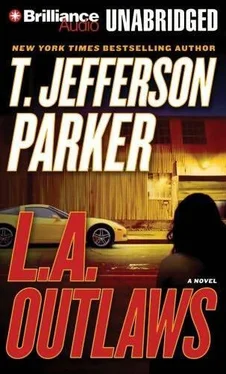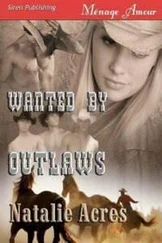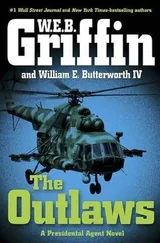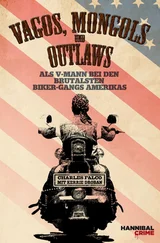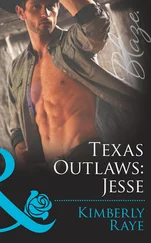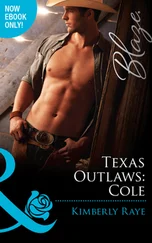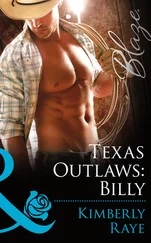Crouching, he shuffled counterclockwise around the car. Empty, no alarm lights flashing on the dash, door locks down, the driver’s seat positioned up close to the wheel for a short man. When he came back to where he’d started, Hood lowered the gun and swung the flashlight beam up to the top of the nearest dune. Then the dune on the other side of the road. Nothing moved except what was moved by the wind.
Hood sensed something behind him. He spun around and aimed the beam into the empty desert, his gun steady and his chest knocking against his shirt. Then he swung hard right where the pale flash at the edge of his vision was only the darkness pulling an owl back in.
Be still, he thought: still.
He turned off the light and lowered both it and the gun and stood in the road in the bare moonlight. He turned slowly in a circle, moving his head to keep the wind from blowing straight into his ears.
Owls have wings and men have feet.
With the beam pointed down to the road, the tracks were easy to see and distinguish from his own. They were boot prints, small-like the ones Hood had seen by the stream in Valley Center, where Lupercio had talked with Jordan Jones and surrendered his precious identity.
The prints led away from the car then down the road toward Madeline’s house then disappeared where Lupercio had given up road for desert.
It took Hood a while to find the trail again but when he did the footprints were easy to follow.
He was halfway back to the house when he saw the cruiser coming up the road from the signal. A moment later it bounced onto the driveway and started up the hill toward the house.
He turned on his cell phone and it rang almost immediately.
“Hood? This is Officer Jackson, Bakersfield PD, here at the Jones residence. Talk to me.”
“He’s there. He’s close.”
“Whoa, podner-what are you talking about?”
“Lupercio Maygar. Ex-Mara Salvatrucha. We like him for two murders down in San Diego four days ago.”
“What’s your ten-twenty?”
“The middle of the desert about two hundred yards north of the driveway you’re coming up. His car is out here but he isn’t. His footprints are aimed straight at the house. He’s armed and extremely dangerous.”
“What’s he doing here?”
“He’s after the Jones daughter. She’s a possible witness. The house off to your right belongs to the mother.”
“We’ll have a look. Maybe you should get back here.”
“If he gets around you, he’ll head back to his car.”
“I’ve got a good partner and a twelve-gauge. He’s not getting around us.”
“Get backup.”
Hood saw the cruiser stop outside the Jones house. A spotlight blasted on, bleaching the adobe wall white. He turned and looked back in the direction of the Lincoln. He couldn’t see it, but he could see the two sand hills that it was parked between.
“It’s Friday night in Bakersfield, Hood-we’re thin. We’ve got a spot on the place right now. We’ll look around. If we see anything interesting, we’ll get backup. If you want to stand out in that desert and watch a car go nowhere, be my guest.”
Hood punched off as he watched the spotlight roam the wall, and the garage outside the wall, then the courtyard entryway.
The cruiser headlights went out and the doors opened. In the interior lights Hood watched the two officers climb out, flashlights on, one patrolman carrying a combat shotgun, the other with his sidearm drawn. Their beams searched the wall and together they disappeared around one side of it. A minute later they had come full circle. No Lupercio scattering into the night. The shotgun cop turned and looked into the desert in Hood’s direction.
The one with the pistol swung open the wooden gate to the courtyard, backing up and using it for cover. The cop with the shotgun stood with his back to the adobe, and when the opening was wide, he crouched low and followed his light inside. It looked like the pistol cop was trying to secure the gate open, but he gave up and followed his partner in.
The gate slammed shut in the wind.
Hood saw the dull explosion of light behind the courtyard wall, then another. A second later came the muffled reports of the shotgun.
He ran for the house, gun still drawn, flashlight still in his left hand.
They got him, he thought. Two shots from the riot gun at close range.
He heaved across the desert and the driveway and swung open the gate. The shotgun cop lay on his back just inside the entrance. His head was intact but his face and everything behind it was gone, and through this crude tunnel Hood saw the gravel of the courtyard floor wet and red. The dead man’s finger was still inside the Remington’s trigger guard.
His partner was sprawled faceup over the chair that Hood had been sitting on with the cat half an hour earlier. He was breathing fast, his upper chest and neck in ribbons, eyes staring out at Hood from behind a mask of blood. He reminded Hood of someone but Hood had no presence of mind now for memory. The cop breathed faster and tried to stand but the chair began to topple. Hood caught him and eased him to the floor but by the time he did this the cop had stopped breathing and Hood could hardly get a pulse.
He pulled back the man’s head and closed his nose and breathed for him twice, then straddled him and continued the CPR with twenty stiff-armed, flat-palmed compressions against the sternum. He ventilated again, the compressed. And again. Hood lost count. His mouth filled with liquid copper and his throat clenched to keep the bile down. His face and hands and thighs were sticky and warm, and he thought, Jesus, this guy isn’t going to make it but he talked to him anyway, saying stay alive, stay alive, man, open those eyes and come back here right now, man, you come back here.
Hood fumbled out his cell phone, punched 911 and speaker and set the phone beside the cop as he did the cardio thrusts. Through the wind and his own grunting breaths he heard the operator come on, and he gave her the address and said officers down, two officers down but that was all he managed before it was time to breathe again for the cop. Hood got himself off the man and pinched his nose and breathed into him again while the operator assured him in a distant voice that police and medical were on their way.
Immeasurably later the medics pulled Hood away midthrust and took over with the oxygen machine.
Hood sat panting in a corner of the courtyard. He wiped the blood from his mouth with the back of his sleeve and stared wide-eyed and straight ahead. He saw Lupercio’s small boot prints in the gravel and the gore on the gate above the shotgun cop as the paramedics swung it open and took the gurney out.
A while later Hood and two BPD officers were standing atop the sand hill above Lupercio’s car, but the car was gone. He saw the flashlights of two more cops on the dune across the road and two more lights down where the car had been. A helicopter crossed overhead and a spotlight raked the ground below it.
Hood didn’t remember trudging through the desert to get here.
He turned and took a knee and looked out at the chaos of vehicles and flashing lights backed up for what seemed like miles down the driveway of Madeline Jones’s house.
Hood’s first and only crime spree, and his first thoughts of becoming a cop someday, both occurred when he was sixteen.
He’d gotten his driver’s license and the world was open to him through the ancient Chevrolet that he had bought from a neighbor with saved money.
His father had shown him how to pull the block and pistons to be ground at an auto shop, had helped him rebuild the carburetor and put in the new oil pump, radiator, solenoid assembly and brakes.
Читать дальше
